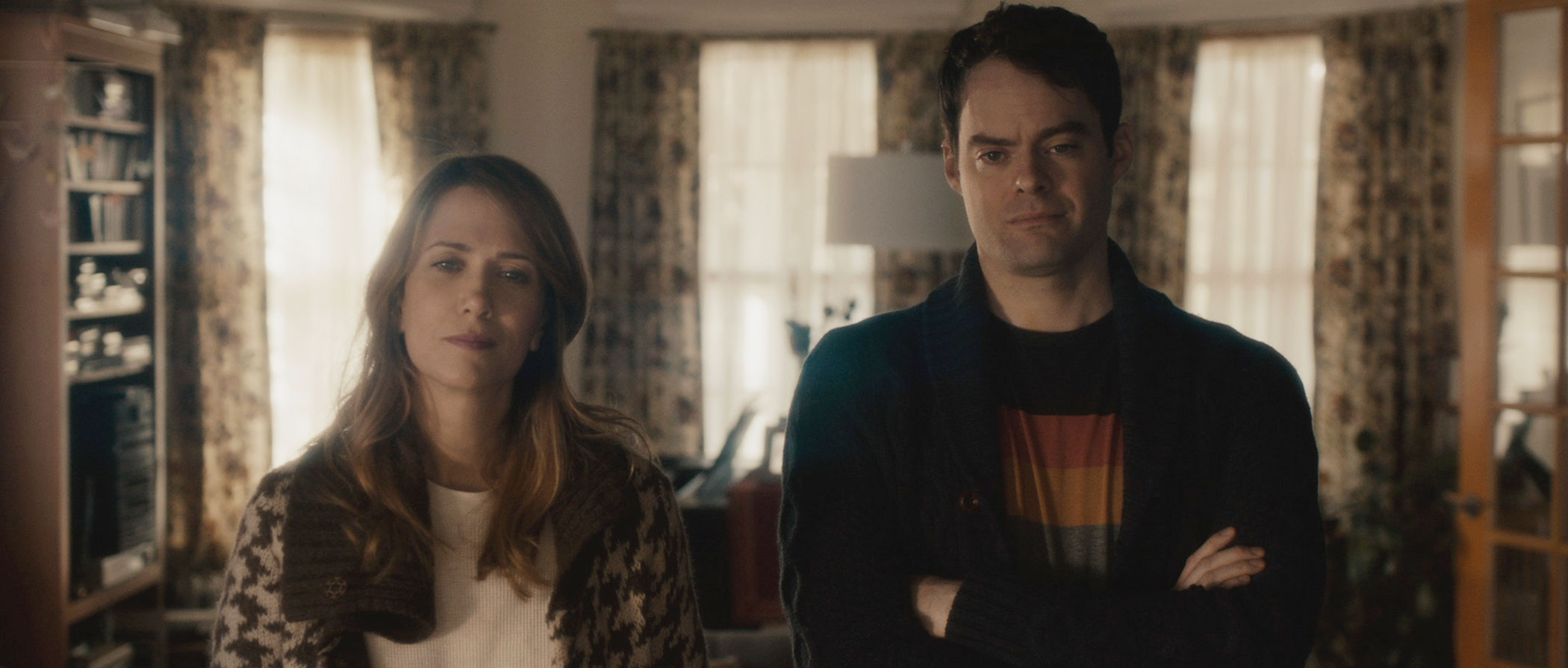
In Los Angeles, Milo Dean (Bill Hader) writes a suicide note — “To whom it may concern: See ya later [smiley face]” — and slashes his wrist. Across the continent, in Nyack, N.Y., Milo’s twin sister Maggie (Kristen Wiig) is ready to swallow a ton of sleeping pills when she hears of Milo’s grand gesture. That brings Milo back to Nyack, after a decade’s estrangement, in Craig Johnson’s Sundance export The Skeleton Twins.
And no, for two of Saturday Night Live‘s finest, this is not an extended riff of old characters — Stefon meets Gilly. Skeleton is a drama, often erupting in painful laughs, about the closest relationship some people ever know: with their siblings. The movie also provides solid evidence that at least two gifted farceurs can display emotional range well beyond the demands of a Lorne Michaels skit-com.
(WATCH: The trailer for The Skeleton Twins)
You may recall two Laura Linney troubled-sibs movies of a while back: her brother played by Mark Ruffalo in You Can Count on Me and Philip Seymour Hoffman in The Savages. As fraternal twins — womb-mates — Milo and Maggie have an even closer kinship-rivalry and a special backstory. Their loving father, who called them “the gruesome twosome,” jumped off a bride when they were 14; their adult lives have been a roundabout journey, either to find the Edenic innocence of their preteen years or to join Dad, wherever he went.
(READ: Jess Cagle’s tribute to Laura Linney in You Can Count on Me)
Milo, who went to L.A. to be an actor but had to settle for waiter gigs, has mastered the wicked banter of his kind. Like the title characters in Paul Rudnick’s play Jeffrey, Milo believes that a gay man’s weapons are “Irony. Adjectives. Eyebrows.” He tells Maggie’s husband Lance (Luke Wilson), who’s eager to have children, that he “can’t wait to be the creepy gay uncle.” Hader goes full Stefon just twice: in blond-wig drag at a Halloween parade and when trying to cheer Maggie up with a duo lip-synching to Jefferson Starship’s “Nothing’s Gonna Stop Us Now.” (Karaokeing to an old pop hit is a corny film trope, but it worked for Jon Cryer in Pretty in Pink and Mike Myers in Wayne’s World, and it’s effective here as well.) Yet coming home has its frustrations. He goes to a local gay bar only to find it’s “Dyke Night.” And renewing his first affair, with high school English teacher Rich (Ty Burrell), is slightly complicated by Rich’s status as a husband and father.
While Milo wears his disease (his depression, not his gayness) like a combat medal, Maggie is a walking wound with a skin-colored Band-Aid. She hides her grief behind a suburban housewife’s little festival of passive-aggressive behavior. In a particularly desperate moment, she screams into a pillow. And when she tells Lance “I love you,” she means “I want to love you but can’t.” Lance, who everyone agrees is the most decent guy in the world, has a knitted-brow heartiness that grates on Maggie. Not his fault: his jock adolescence matured into love for this sweet, strange woman he can’t quite understand. He doesn’t know she’s cheating on him in two ways: by falling into the occasional random affair and by taking birth control pills. Bringing a new Maggie or Milo into the world is a prospect she’s not especially keen on.
(READ: Will Audiences ever love Kristen Wiig in a dramatic role?)
At this year’s Venice Film Festival, one big theme was shotgun suicides. The Skeleton Twins has a subtler vibe: it sees life as the parentheses between suicide attempts. Milo and Maggie endure lives of quiet desperation — stricken looks punctuated by a tray of glasses dropped to the floor (by the twins’ mother, played with an airy overbearing by Joanna Gleason). Nearly from the start, it’s clear that they can relax only when playing the giddy games of their youth and that their sole soul mates are each other. The rest, including Lance and Rich, are mere interlopers, stirring jealousy and resentment. In one of their games, when Maggie dons an orthodontic mask and asks Milo, “Will you go to the prom with me?,” you get the feeling she is mostly not kidding. She needs him as her date and her literal life support.
Johnson and his fellow scripter Mark Heyman (who also cowrote the doppelgänger drama Black Swan) go a little heavy on the objective correlatives, including a pair of goldfish gasping for life. And they toss away all plausibility for the final scene — unless that’s a reference to Ambrose Bierce’s “An Occurrence at Owl Creek Bridge.” (Sorry to be so cryptic; trying to avoid spoilers.)
But the characters and their anxieties are for the most part nicely judged. Besides, The Skeleton Twins is essentially a showcase, a product reel, for Hader’s and Wiig’s emergence from the comedy straitjacket. He does it by mixing effusion and despair, she by subtly displaying an X-ray of a “normal” woman’s crippling anxieties. Maggie might be a figure from a John Cheever story, crying softly in an effort to wake up from the suburban American dream. It’s no fun being a grownup; she wants to return to the bliss of a twin childhood, or to take another dip with Milo in the amniotic fluid that provided the best time of her life — their lives.
More Must-Reads From TIME
- The 100 Most Influential People of 2024
- The Revolution of Yulia Navalnaya
- 6 Compliments That Land Every Time
- What's the Deal With the Bitcoin Halving?
- If You're Dating Right Now , You're Brave: Column
- The AI That Could Heal a Divided Internet
- Fallout Is a Brilliant Model for the Future of Video Game Adaptations
- Want Weekly Recs on What to Watch, Read, and More? Sign Up for Worth Your Time
Contact us at letters@time.com